Office report on 12th Annual InterEthnics/Interfaith Leadership Conference-in line with Democracy and Human Right values held in Japan.
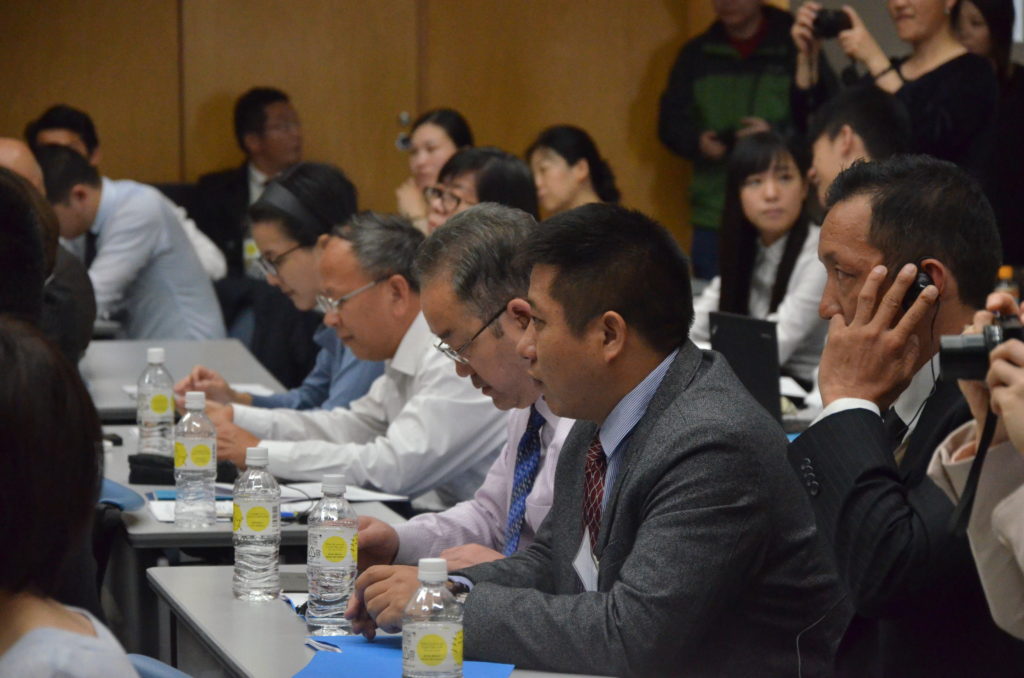
Introduction
The InterEthnic/InterFaith Leadership Conference was established in 2000 by a young Chinese national and now exile in United State of America Dr. Yang Jianli, who is the founder and President of Initiatives for China. The Conference has received guidance and encouragement from Tibetan spiritual leader His Holiness the Dalai Lama, and is financially supported by the US National Endowment for Democracy, Taiwan Foundation for Democracy and other non-governmental organizations. Each year, the InterEthnic/InterFaith Leadership Conference brings together many young human rights leaders and activist from China, Taiwan, Hong Kong, Tibetans from India and Macao who come from a diverse set of ethnic groups (including Han Chinese, Tibetans, Uyghurs, and Mongolians, among others) and faiths (including Christians, Falun Gong practitioners, Buddhists, and Muslims)
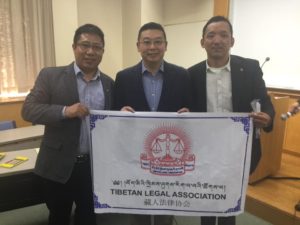
Dr. Yang Jianli, founder and Chairman of Citizen Power for China, Initiative for China.
The eleventh annual InterEthnic/InterFaith Leadership Conference was held in Dharamsala in the Himachal Pradesh State of India, despite much of diplomatic impediment, the probable spokesperson for the Conference were unable to attend the conference due to unable to get their visa for India and China’s pressure, yet the conference was success and attended by many likeminded organization and individual seeking similar agenda.
Twelfth annual InterEthnic/InterFaith Leadership Conference was held in Tokyo, Japan from 14-17 November 2017. The 12th InterEthnic/InterFaith Leadership Conference, organized by Initiatives for China (aka Citizen Power), held at the National Olympics Memorial Youth Center in Tokyo, Japan on November 14-17, 2017. The theme for this year’s Conference was advancing Human Rights, Democracy and Peace in Asian sub continent, formulating new tools, new Strategies for new generation and mainly emphasized on commitment to eliminate the misunderstanding and hatred among interfaith and ethnic group and to increase the mutual understanding and friendship. Furthermore, the Conference seeks to form a united front to promote a peaceful democratic transition in China.
The Tibetan Legal Association and InterEthnics/Interfaith Leadership Conference.
In the year 2016, when the eleventh Interethnic/Interfaith Leadership Conference was held in India at Dharamsala, the Tibetan Legal Association Co-hosted the event along with other organizations. It was from the year 2016 that members of the Tibetan Legal Association got actively involved with the conference and have agreed upon equally participating and co-hosting the event annually whenever and wherever the future conference on Democracy and Human Rights are to be organized by Dr. Yang Jailini.
12th Annual InterEthnics/Interfaith Leadership Conference in Japan.
The members of the Tibetan Legal Association was invited by the Chairman and host of the InterEthnics/Interfaith Leadership Conference Dr. Yang Jianli for the 12th Annual Interfaith/Interethnic Leadership Conference to be held in Japan from 14th to 17th November 2017, after having received with letter of invitation for the same by the organiser, The President and the Secretary of the Tibetan Legal Association Mr. Lobsang Dakpa and Mr. Kunsang Topden attended the said conference.
There are various individual representatives of different ethnicity group from various Asian countries like Japan, Hong Kong, Singapore, Taiwan, China, Mongolia, Macao and Tibetans from India, Australia and America who also attended the conference.
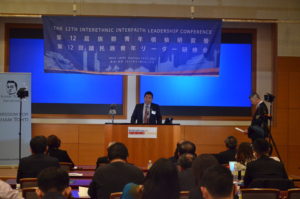
President of TLA Addressing on the Conference
Detail report on the Interethnic/Interfaith Conference held in Japan.
Day I: – Tuesday, November 14th, 2017
Venue: – National Olympic Youth Memorial Centre.
Opening Ceremony.
On dated 14th November 2017, at 7:00PM the conference on Interethnic/Interfaith leadership was started with the formal meeting of all the participants chaired by Dr. Han Lianchao, the Vice President of Citizen Power for China, who gave a formal speech on the initiative and its history of emergence. He mainly emphasized on the importance of unity amongst the minority ethnic group and spoke of working for the interest minority through such conferences.
Further, the meeting was chaired with speakers from different individual representing various ethnic groups throughout Asia, which are as follows.
- Makino Seishu, former Japanese Member of Parliament and chair of Human Rights Foundation.
- Lungtok la, representative of His Holiness the Dalai Lama for Japan and East Asia.
- Maysing Yang, Vice President of Taiwan Foundation for Democracy, Taiwan Ambassador.
- Murakami Masatoshi, Former Japanese member of parliament.
- Baggio Leung, Leader of the Hong Kong Umbrella Movement, Former Hong Kong Legislator.
- Kyinzom Dongue, Tibetan Parliamentarian in exile representing Australia.
- FEI Liangyong, Chairman of forum for a Democratic China.
- Zubayra Shamseden, Chinese Outreach Coordinator, Uyghur Human Rights Project.
- Xue Wei, President of International Chinese Tibetan Association.
- Eun Kyong Kwon, Director of Open North Korea.
- Lobsang Dakpa, President of Tibetan Legal Association
- Urgen, Vice Chairman of southern Mongolia Congress.
Those who were not able to attend the conference have sent their video message.
- There was a holy message from His Holiness the 14th Dalai Lama about the conference, were he appreciated about the emergence of such conference on democracy and Human Rights. He mainly emphasize upon the unity amongst every ethnic group and creation of any society based on democratic and Human Right Values. He congratulated the organiser for the same.
- Taiwan Legislator Chen Hsueh Sheng has also sent his video message for the conference.
- Irwin Cotler, Former member of the Canadian Parliament, former Minister of Justice.
There were other dignitaries who could not have made it to the conference, yet they have sent their written statement for the same.
- Marco Rubio, US Senator.
- Ted Cruz, US Senator.
- Nancy Pelosi, US Congresswomen & Minority Leader.
- Jamie Raskin, US Congressman.
- Randy Hultgren, US Congressmen.
- Chris Smith, US Congressmen.
- Yu Mei-Nu, Taiwan Legislator.
- Rebiya Kadeer, Uyghur Human Rights Leader.
- Topochog Enghebatu, Director of southern Mongolia Human Rights Information Center.
- Yang Jianli, the founder and the President of Initiatives for China/Citizen Power for China at the end of first half of the meet (Day 1) made a opening Remarks, where he mainly stated that with a various reasons and objectives such initiatives was being made, mainly absence of Democracy and Human Right values in Communist China. And it has become worst than before with Communist China emerging as super power.
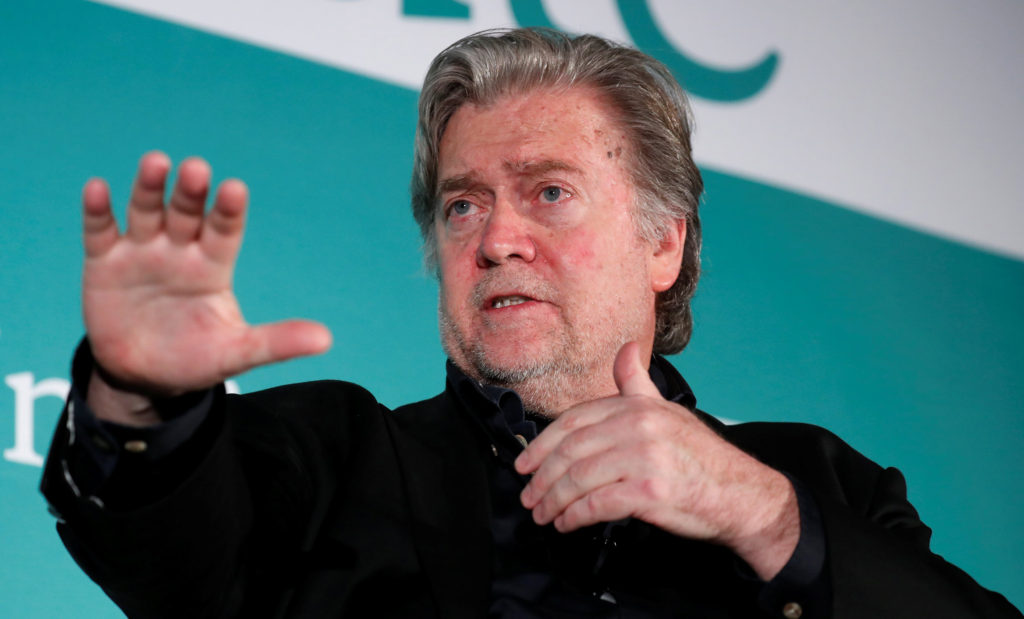
Former White House Chief Strategist Steve Bannon participates in a Hudson Institute conference on “Countering Violent Extremism: Qatar, Iran and the Muslim Brotherhood” in Washington, U.S., October 23, 2017. REUTERS/Kevin Lamarque
At 20:30- 22:00 Panel Discussion I
A panel discussion on the topic ‘Post 19th Party-Congress difficulties and Opportunities facing various groups represented at the conference’ was chaired by Mr. Hideya Yamamoto, senior staff writer of the Senkei Shimbun. And the guest speakers were…
- XU Yunpeng, Independent Scholar of China.
- Zubaraya Shamseden, Chinese Outreach Coordinator, Uyghur Human Rights Project.
- Kunga Tashi, Chinese Liaison Officer of Central Tibetan Administration.
- Wai-Ching Yua, Member of Youngspiration, former Mmeber of Hong Kong Legislator.
- Jirigal, southern Mongolian Human Right Activist.
Day II: Wednesday, November 15th, 2017
Venue: – National Olympic Youth Memorial Centre, Central Building, Room 401.
Keynote speaker Mr. Steve Bannon.
At 9:30 AM, Meeting was chaired under Dr. Yang Jianli and the Keynote speaker was Mr. Steve Bannon, former White house Chief Strategist. Though the topic for his speech was particularly on ‘Forging an Alliance of Asian Democracies Responding to China’s Influence and threats‘ but he spoke from wide range of issues from American diplomacy with Democracy and Human Rights values. He spoke of recent 19th National Congress of the Communist Party of China meet in Beijing and stated China draconian policies of One road One belt polices and considered it as a wakeup call for the rest of the world, with its expansionist polices, both geographically and financially. He further, emphasizes upon strategies of President Donald Trump from his election campaign days till nowadays, keeping democracy and human right values as paramount.
Panel Discussion II
Title: Democracy and Peace in East Asia.
At around 10:40 AM, a panel discussion chaired by Professor Homare Endo, University of Tsukuba on the subject ‘Democracy and Peace in East Asia’. And the speakers were
- Yoichi Kato, Senior fellow API Initiative.
- Madam Ambassador Yang Maysing, Vice President of Taiwan Foundation for Democracy, Ambassador at large.
- FEI Liangyong, Chairman of forum for a Democratic China.
- Eun Kyong KWON, Director of open North Korea.
- Shin Harimoto.
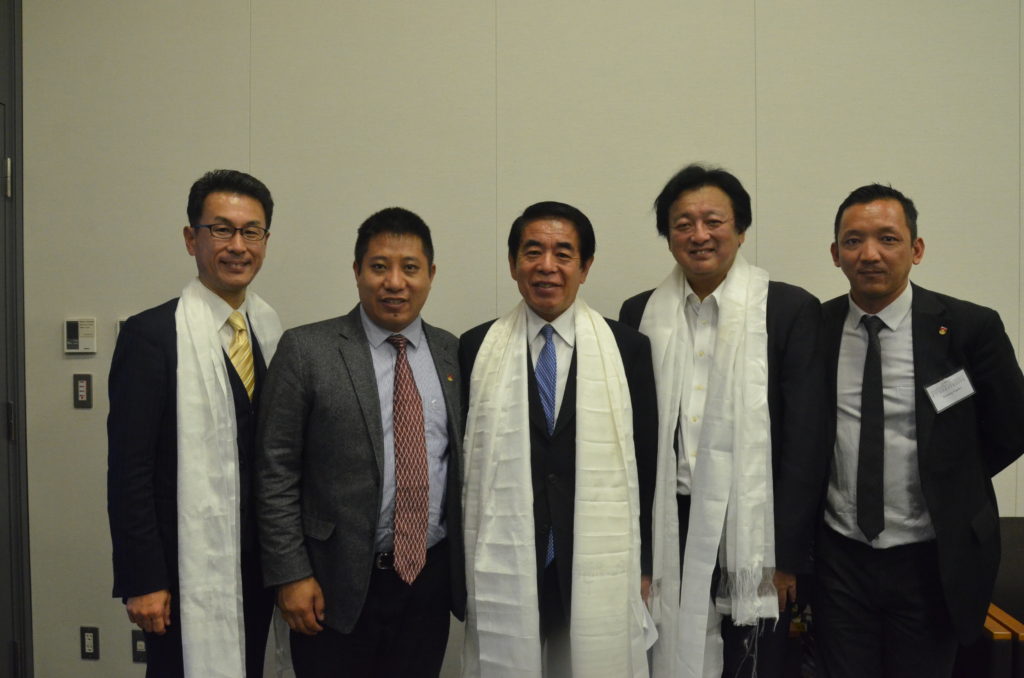
President and Secretary of TLA with Japan parliament members
At 13:00PM, A documentary Film was shown with a Title: In the name of Confucius. Further, there was a discussion with the film maker Ms. Doris Liu.
Synopsis of the documentary film shown.
In the name of Confucius is the first documentary expose of China’s multi-billion dollar Confucius Institute (CI), a Chinese language programme that have found their way into 1.500 universities and schools worldwide. Beijing describes the CI as an important part of china’s ‘overseas propaganda set up’ and continues to open new institute at a rate of one every week or two. Featuring the exclusive personal story of a former CI teacher, Sonia Zhao, whose defection and complaint let to the first closure of a CI on a North American campus, and the unprecedented outcry against Canada’s largest school board, the TDSB, over its plan to open the world largest CI, the film examines the growing global controversies surrounding the Confucius Institute-loss of academic integrity, violation of Human rights codes, foreign influence and even potential infringement on national security.
At 14:20PM, Australian Member of Parliament Michael Danby spoke on the topic ‘China’s influence on, Infiltration in and Threat to Asia Pacific Democracies’, chaired by Mr. Murakami Masatoshi.
At 15:30 PM, Training workshop I
The training was held on the topic, Digital Security facilitated by Mr. Luo Shihong, a human right activist. The workshop mainly emphasised on how to choice and wisely use those digital devices in the 21st century were there are many computer hacker and genesis interfering the work done in your digital devices. Special emphasis was made on mailing account and social media network, where mostly outsider intrusion happens.
He suggested in not using Wechat App, which is a state (Communist China) run social media application, where Chinese official can record and trace any data fed in individual’s accounts. And Twitter is not safe as well, instead of Twitter he suggested to use Twister or Bitcom. Likewise, he also suggested using AVAST as an antivirus in respective offices or private gadgets safety. Instead of using yahoo or gmail, he suggested on using hush mail or Protonmail.com, which are safer and more reliable.
At 19:00PM, Training workshop II
Mr. Luo Shihong, Human Rights Activist spoke on the topic ‘UN Human Rights Mechanisms.
Day III: Thursday, November 16, 2017.
Venue: Japan National Olympic Youth Memorial Centre, Central Building, Room 401.
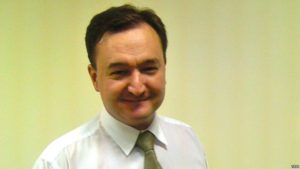
Late Mr. Sergey Magnitsky
At 9:00 AM Training workshop III
TITLE
‘How to use the Global Magnitsky Sanction, a mechanism to Combat Human Right abusers’.
One of the interest generation topics amongst the participants in the conference was ‘Global Magnitsky Sanction’ a bill which was passed by United State of America during President Barrack Obama administration.
Brief background of the sanction:-
William Felix Browder is an American-English financier, the Chief Executive Officer and co-founder of the investment fund Hermitage Capital Management, an investment firm that at one time was the largest foreign portfolio investor in Russia. He gave up his US citizenship in 1998 to avoid paying taxes related to foreign investment. After having business in Russia for 10 years, Browder was refused entry to Russia in 2006 as a threat to national security; he has said it was because he exposed corruption.
After the death in prison in 2009 of Sergei Magnitsky, a Russian lawyer and auditor who Mr. William Felix Browder has hired and had represented his company and conducted an investigation into massive tax fraud related to it, Browder lobbied for Congress to pass the “Magnitsky Act“, a law to punish Russian human rights violators, which was signed into law in 2012 by then President Barack Obama.
In 2013, Mr. Browder was tried in absentia in Russia for tax fraud, jointly in a posthumous prosecution of Magnitsky. He was convicted and sentenced to nine years in prison. Interpol rejected Russian requests to arrest Browder, saying the case was political. In 2014, the European Parliament voted for sanctions against 30 Russians believed complicit in the Magnitsky case; this was the first time it had taken such action.
In July 2017, Mr. Browder testified to the U.S. Senate Judiciary Committee on Russia’s alleged interference in the 2016 US presidential election through use of persons in Washington, DC.
On October 19, 2017, Canada enacted its own Magnitsky Act, the Russian-sanctions bill that Browder had first sponsored in the U.S. On October 21, Putin placed Browder on Interpol‘s arrest list. That same day, Browder’s U.S. visa was revoked, effectively banning him from the United States. After a protest by U.S. Congressional leaders, his visa was restored the following day.
The Magnitsky Act, formally known as the Russia and Moldova Jackson–Vanik Repeal and Sergei Magnitsky Rule of Law Accountability Act of 2012, is a bipartisan bill passed by the U.S. Congress and signed by President Obama in November–December 2012, intending to punish Russian officials responsible for the death of Russian tax accountant Sergei Magnitsky in a Moscow prison in 2009.
Sergei Magnitsky’s Background:-
In 2009, Russian tax accountant Sergei Magnitsky died in a Moscow prison after investigating fraud involving Russian tax officials. While in prison, Magnitsky developed gall stones, pancreatitisand calculous cholecystitis and was refused medical treatment for months. After almost a year of imprisonment, he was beaten to death while in custody.
Law:-
In June 2012, the United States House Committee on Foreign Affairs reported to the House a bill called the Sergei Magnitsky Rule of Law Accountability Act of 2012. The main intention of the law was to punish Russian officials who were thought to be responsible for the death of Sergei Magnitsky by prohibiting their entrance to the United States and their use of its banking system.
The legislation was taken up by a Senate panel the next week, sponsored by Senator Ben Cardin, and cited in a broader review of the mounting tensions in the international relationship.
In November 2012, provisions of the Magnitsky bill were attached to a House bill normalizing trade with Russia (i.e., repealing the Jackson–Vanik amendment) and Moldova. On December 6, 2012, the U.S. Senate passed the House version of the law.
The law was signed by President Barack Obama on December 14, 2012. Congress enacted the Global Magnitsky Act which allows the US Government to sanction foreign government officials implicated in human rights abuses anywhere in the world.
WORKSHOP ON MEGNASKY ACT AND PRESENTED BY Dr. HAN LIANCHAO.
With the basic concept upon which Global Magnitsky Act was sanctioned was that of sanction implicated against any of the foreign government officials in violation of Human Rights and abuses. With such views in mind and number of Human Right abuses or violation that happens under the Communist regime of China and number of social workers, lawyers and activist who are being arbitrarily killed or jailed in China, such workshop was carried out under the guidance of Dr. Han Lianchao.
Dr. Han Lianchao while explaining the Global Magnitsky Act.
The main procedure for the implementation of such Act was within simple sets of methods or procedures which are to be carefully implemented, which are as follows…
- What?
Under what, it implies what is the basic reason with which such individual has been targeted or arrested or detained or killed with what reasons?
- Where?
And under ‘where’ clause it means, where does such inhumane and act of brutal has happened and where exactly?
- When?
Under ‘when’ one has to specifically signify when such incident took place and under whose jurisdiction etc.
- Who?
Who are the officials involved in such act or who is the individual who has been subjected to such abuse, torture or arbitral death or rape etc?
- Why?
One has to specify the reason why such individual has been subjected to such torture and human right violation. Likewise, why such person and on what ground Magnitsky sanction is to be implemented against such individual.
- How?
How such individual who is said to have committed human right violation against anyone is to be booked and brought under Magnitsky sanction. There are sets of procedure which are to be followed.
Under such categories of what/where/when/why/how clause of Magnitsky Act, one has to tell, explain and describe the authorities concern about how such sanction can be invoked against such individual.
Individuals affected under the Magnitsky Act are as follows so far.
The Obama administration made public a list of 18 individuals affected by the Act in April 2013. The people included on the list are:
- Artem (aka Artyom) Kuznetsov, a tax investigator for the Moscow division of the Ministry of Internal Affairs.
- Pavel Karpov, a senior investigator for the Moscow division of the Ministry of Internal Affairs.
- Oleg F. Silchenko, a senior investigator for the Ministry of Internal Affairs.
- Olga Stepanova, head of Moscow Tax Office No. 28.
- Yelena Stashina, Tverskoy Court judge who prolonged Magnitsky detention.
- Andrey Pechegin, deputy head of the investigation supervision division of the general prosecutor’s office.
- Aleksey Droganov.
- Yelena Khimina, Moscow tax official.
- Dmitriy Komnov, head of Butyrka Detention Center.
- Aleksey Krivoruchko, Tverskoy District Court judge.
- Oleg Logunov.
- Sergei G. Podoprigorov, Tverskoy District Court judge.
- Ivan Pavlovitch Prokopenko.
- Dmitri M. Tolchinskiy.
- Svetlana Ukhnalyova.
- Natalya V. Vinogradova.
- Kazbek Dukuzov, Chechen acquitted of the murder of Paul Klebnikov.
- Lecha Bogatyrov, implicated by Austrian authorities as the murderer of Umar Israilov.
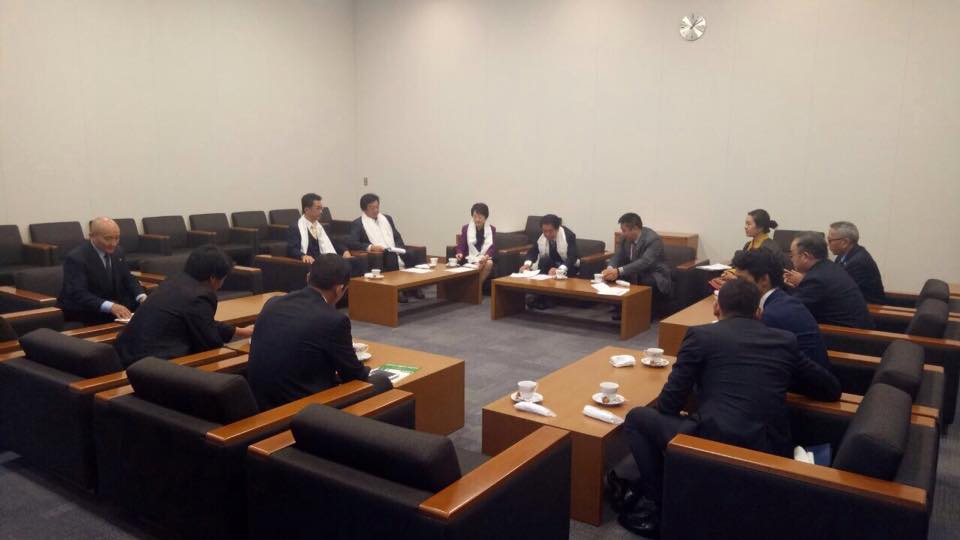
meeting with members of parliament, Japan
Countries which has implemented Global Magnitsky Act.
AMERICA: – America was the first country in the world which has enacted a law (Sanction) in the name of Global Magnitsky Act, against every individual in the world who has violated Human Right values against any individual and prohibited their entry and financial system within the states of America since 2012 Obama Administration and so far they have enlisted 18 individual in the Magnitsky Act.
CANADA: – Canada has passed its own version of the U.S. Magnitsky Act, which sanctions Russians for alleged human rights abuses, sparking angry comments from Russian officials, including President Vladimir Putin. The Justice for Victims of Corrupt Foreign Officials Act (Sergei Magnitsky Law), which earlier passed both houses of the Canadian Parliament, on October 19 received royal assent, which is required before a bill can come into force. The law will allow for the freezing of assets and visa bans on officials from Russia and other nations considered to be guilty of human rights violations.
It will also prevent Canadian firms from dealing with foreign nationals who are “responsible for, or complicit in, extrajudicial killings, torture, or other gross violations of internationally recognized human rights.” The United States passed the Magnitsky Act in 2012 with similar sanctions for Russians alleged to be involved in human rights violations. The law was inspired by Russian lawyer Sergei Magnitsky, who helped uncover a massive tax-fraud scheme in Russia but was arrested by authorities and died in a Moscow jail in 2009.
Actual ground implementation of Global Magnitsky Act before United state of America’s authority.
After sanctioning of the Global Magnitsky Act, former President Barrack Obama has approve his assent for the implementation of the same Act in around the world for the violation of human right abuses. Likewise, on September 8th 2017, incumbent President Donald Triumph signed the memorandum approving his assent for the implementation of Global Magnitsky Act. Further, he vested the authority came to him through the Constitution and law of the United State of America under section 301 of title 3, USC delegate such authority to Secretary of the Treasury in coordination with the Secretary of the State.
He further delegated under memorandum to the Secretary of the State to administer Visa sanctions under section 1263 of the Magnitsky Act.
Delegated authority for the implementation of such sanction (Magnitsky Act)
The Secretary of the State and Secretary of the Treasury of the United States of America are designated or delegated authorities to maintain and approve sanction for the implementation of such Act upon any individual who are suspected or convicted for the infringement of human right abuses around the world.
Contact and Mailing detail how to contact State authority for the Magnitsky Act.
- globalmagnisky@state.gov
- glomag@treasury.gov
13:30PM: – In the afternoon around 1:30pm we were escorted in a bus for a Japanese tour.
15:30PM: – Participant and members of the Conference were escorted for de’ tour around the Japanese house of representatives.
16:00PM: – The 2017 Citizen Power for China Award Ceremony was begun at the First House of House Representatives of Japan. MC- Mr. Daisuke Kitai, General Secretary of Amnesty International, Japan.
The Vice President of Initiative for China Dr. Han Lianchao announces the Recipients of the 2017 Citizen Power Awards.
Recipients of the awards are as follows:-
- Makino Seishu, who gave a warm speech on values of democracy and human right values. The award was presented to him by Dr. Yang Jianli and Mr, MP Michael Danby.
- Iham Tohti and Mr. Enver Can accepted the award presented by Dr. Yang Jianli on behalf of Iham Tohti.
- Wang Qiaoling, whose award was accepted by Ms. Ambassador Maysing Yang, presented by Dr. Yang Jianli and MP Michael Danby. Later she reads a statement of acceptance on behalf of the Ms. Wang Qiaoling.
17:00PM– Keynote speech on the title ‘Forging Alliances of Asian Democracies and help Asian Dictatorship Democratize’ was given by the MP Michael Danby.
17:30PM- Dr. Yang Jianli gave a keynote speech on the title ‘The prospect of China’s Democratization under the New Dictatorship’
Day IV: FRIDAY, November 17, 2017.
Venue: – Central Building, room 401.
9:00 AM- Training Workshop IV
Dr. Han Lianchao gave a remaining lecture on the title ‘How to use the Magnitsky Sanction Mechanism to Combat Human Rights Abusers.
11:10AM– Joint discussion was held on the subject how to jointly use the Magnitsky sanction in combating human right abuser around the world, specially our Asian Sub Continent.
11:45PM- Closing Ceremony
After the successful four days intensive conference coupled with workshop training and know how to use the Global Magnitsky Act upon those Human Right Abusers around the world, Dr. Yang Jianli, the chairman and the head of Citizen Power For China Initiative gave a wonderful and encouraging speech on unity and how to work jointly upon generating awareness and interest amongst general Asian population in Democracy and Human Right values.
He further along with Dr. Han Lianchao handed over the Citizen Power for China’s Initiatives of Interethnic/Interfaith Conference banner to the Australian participants Mrs. Kyinzom Dongdue and Mr. Feng Haiguang to signify that the next conference will be held in Australia and that all the groups will commit to joint efforts to push Magnitsky Legislation in Australia in days to come and to curb the inhumane treatments of authorities or individual against Human right and democratic values.
And finally the conference concludes with remarks from Mrs. Kyinzom Dongdue and Mr. FENG Haiguang.
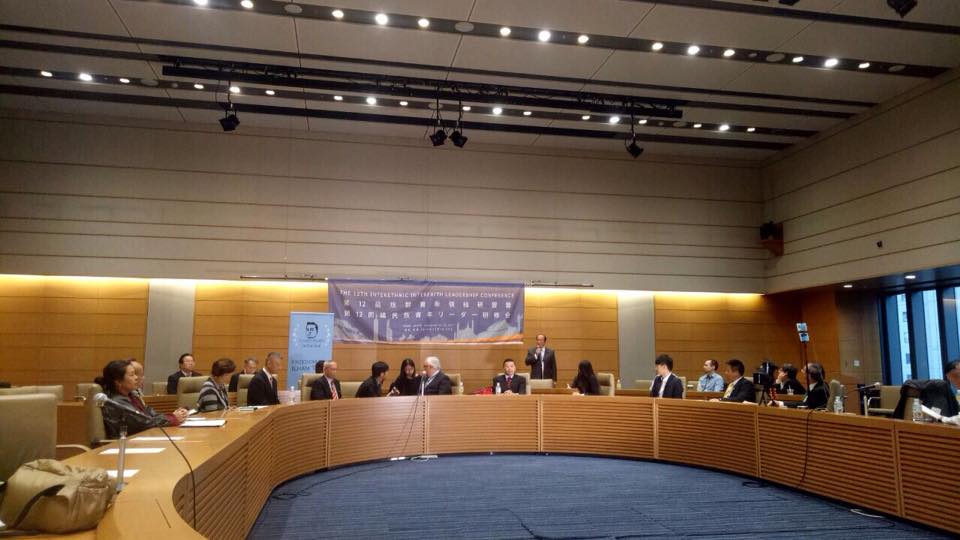
Conference at Japan parliament conference hall
Our understanding and knowledge gained through the 12th Interethnic/Interfaith Leadership Conference.
The 12th Interethnic/Interfaith Leadership Conference held in Japan Tokyo under the leadership of Dr. Yang Jianli and Citizen Power for China Initiative was grand success. Through this conference, the President and the Secretary of the Tibetan Legal Association Mr. Lobsang Dakpa and Mr. Kunsang Topden has managed to get acquainted with many prominent human right defenders, activist, scholar and former and incumbent members of parliament of various Asian countries. The president of the Tibetan Legal Association was able to convey the aims and objectives of our Association to the greater public attended the conference and appraised paramount of international democratic and human right values in this 21st century and further specifically stressed upon urgent need of maintaining human right values and democratic set up within the Communist China, majorly effecting the Tibet and its people under the communist regime. He further calls for international communities and Asian sub-continent to come together in support of Tibet in the name of humanity and upholding the international democratic and human right values.
One of the crucial tools which all the participant in the conference learnt was that of ‘Global Magnitsky Act’, which was formerly adopted and enacted by the USA government since 2012 and further such module has been acknowledged and accepted/implemented for same in Canada.
The training workshop and method for the implementation of Global Magnitsky Act was the most crucial aspect of the Conference and through which, we believe members of Tibetan civil society around the world, with manner of proof and evidence assembled, which are required for the adoption of such Act can make wider differences in the deep rooted deprivation of human values and rights amongst Tibetan inside Tibet and can do wonder or make official of the communist regime be aware about the repercussion which they might have later, if their present work involves much of inhumane treatments, without the dignity towards the Tibetans in Tibet, which will be subjected to such Act, out of which they will be forever banned to visit the country USA and Canada and their financial linkage with those countries will be held up.
by: – Kunsang Topden
